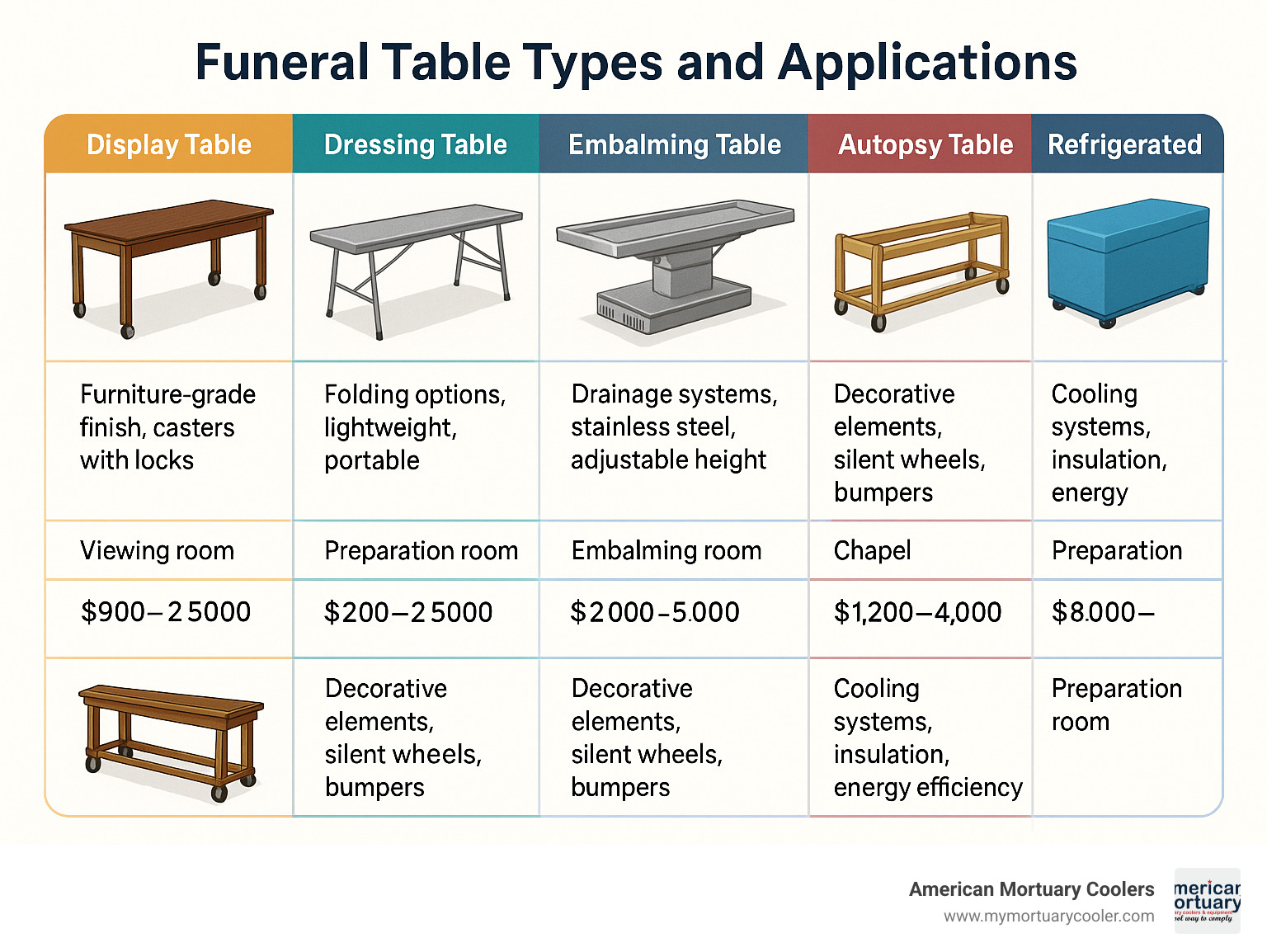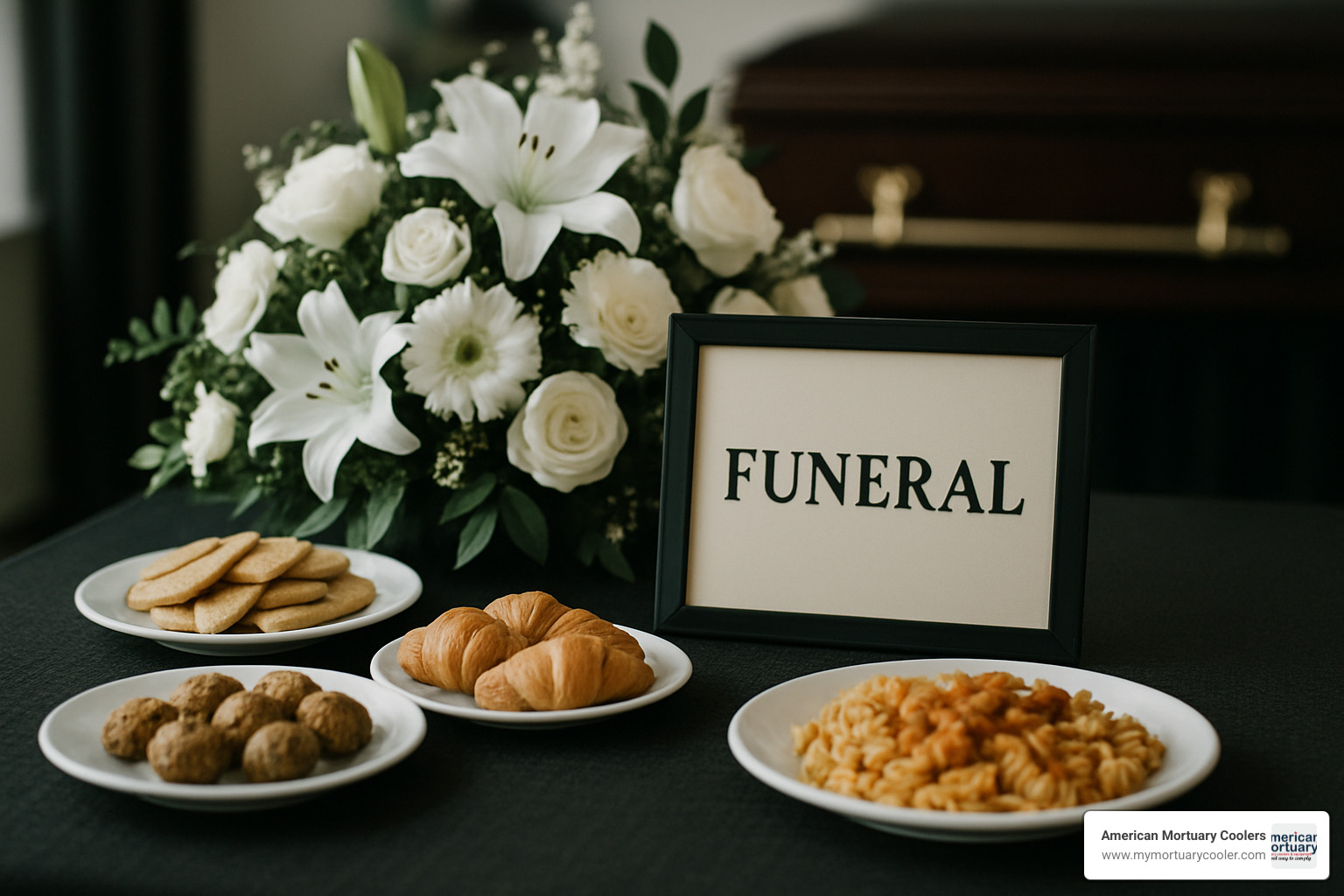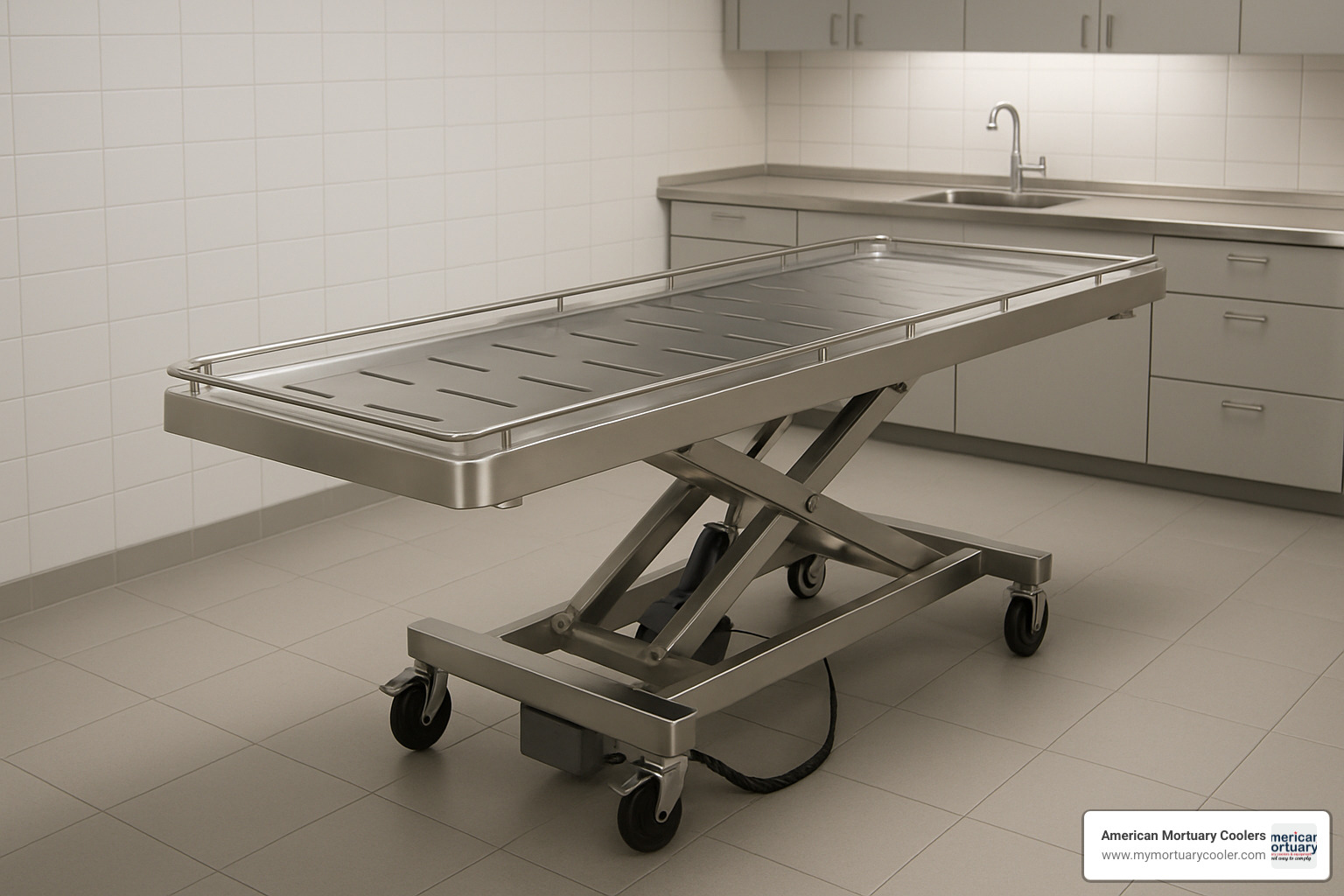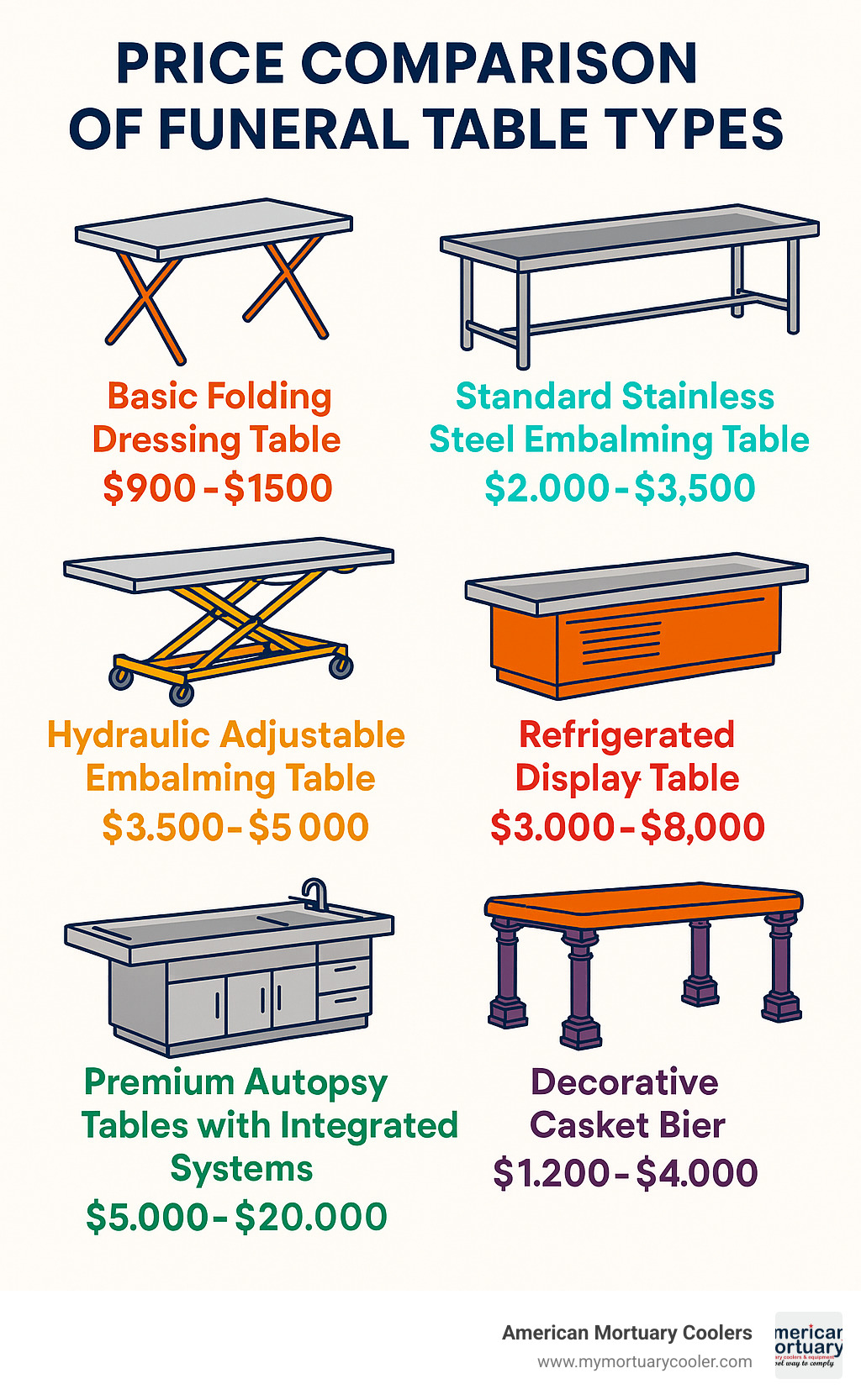Understanding Funeral Tables: The Foundation of Dignified Care
A funeral table is a specialized piece of equipment used in funeral homes and mortuaries for preparing, presenting, and honoring the deceased. If you're looking for quick information about funeral tables, here's what you need to know:
| Funeral Table Type | Primary Purpose | Average Price Range | Key Features |
|---|---|---|---|
| Display Table | Presentation of the deceased during viewing | $1,000-$3,000 | Furniture-grade finish, casters with locks |
| Dressing Table | Clothing and cosmetic preparation | $900-$2,500 | Folding options, lightweight, portable |
| Embalming Table | Technical preparation procedures | $2,000-$5,000 | Drainage systems, stainless steel, adjustable height |
| Autopsy/Dissection Table | Medical examination | $3,500-$20,000 | Integrated sinks, ventilation, specialized lighting |
| Casket Bier | Supporting casket during services | $1,200-$4,000 | Decorative elements, silent wheels, bumpers |
| Refrigerated Table | Temperature-controlled preservation | $3,000-$8,000 | Cooling systems, insulation, energy efficiency |
The funeral table stands as the centerpiece of mortuary operations, serving both practical and ceremonial functions in the death care industry. These specialized tables come in various forms—from clinical stainless steel embalming tables to neat wooden casket biers—each designed to meet specific needs in the funeral service workflow.
Funeral professionals understand that the right table isn't just equipment—it's an essential tool that enables them to provide dignified care while meeting health regulations and operational demands. Whether you're establishing a new funeral home, upgrading existing equipment, or simply learning about the industry, understanding funeral table options is crucial for providing respectful and efficient services.
I'm Mortuary Cooler, a national-level mortuary cooler supplier with extensive experience helping funeral directors select appropriate funeral tables that complement their preparation rooms and cooling systems. My expertise in funeral tables comes from years of consulting with funeral homes across America on complete mortuary equipment solutions that improve workflow efficiency and compliance.

Funeral table word list:
Funeral Tables 101: Definition, Purpose & Types
The journey of caring for our departed loved ones has come a long way. From simple wooden boards used in ancient times to today's specialized equipment, the evolution of funeral care reflects our deepening commitment to dignity in death. The modern funeral table emerged in the late 19th century, right alongside the professionalization of funeral services and embalming practices. These tables aren't just pieces of equipment – they're the foundation of a funeral home's entire workflow, supporting every stage from initial care to that final, meaningful presentation.
What is a funeral table?
At its heart, a funeral table is specialized equipment created with one purpose: supporting the deceased during the various stages of funeral preparation and presentation. These tables serve two essential roles – providing a stable, functional platform for technical preparation procedures while also creating a dignified surface for viewing and ceremonies.
You'll find different types of funeral tables throughout a funeral home, each in its perfect place:
- Preparation rooms house embalming and dressing tables
- Storage areas contain refrigerated tables
- Viewing rooms and chapels feature display tables and casket biers
As Brian Smith, a funeral director with 25 years of caring for families, puts it: "The right funeral table makes all the difference in our ability to provide respectful, efficient care. It's the unsung hero of funeral service—the foundation upon which we build our work."
Main types of funeral tables
The funeral profession relies on several distinct types of funeral tables, each designed for a specific moment in the care journey:
Display Tables create the setting for those precious final moments together. With furniture-grade finishes and thoughtful decorative elements, these tables prioritize beauty while maintaining the functionality needed for viewings.
Dressing/Folding Tables help with the gentle work of clothing and cosmetic preparation. Lightweight and often portable, many models fold away for easy storage – perfect for funeral homes where space is at a premium.
Embalming Tables serve as the workhorse of the preparation room. Built with drainage systems, perforated surfaces, and adjustable heights, these stainless steel tables prioritize function to support the embalming process with dignity and efficiency.
Autopsy/Dissection Tables feature integrated sinks, comprehensive drainage, and sometimes specialized ventilation for medical examinations. These tables meet the strict sanitation requirements needed for their purpose.
Casket Biers hold caskets during services with grace and stability. Often crafted with beautiful woodwork and silent-rolling wheels, these supports blend seamlessly into ceremonial settings.
Refrigerated Tables provide temperature-controlled preservation without chemical embalming. They've grown increasingly popular as more families seek green funeral options.

How funeral tables support preparation & presentation
The best funeral tables incorporate thoughtful features that support both technical needs and ceremonial dignity:
Weight Capacity matters tremendously in providing care for all. Modern funeral tables typically support up to 650 pounds, ensuring safe handling for most decedents. For additional needs, bariatric models offer even greater capacity – some supporting up to 1,000 pounds.
Drainage Systems in embalming tables feature carefully designed troughs and outlets that channel fluids away from the work area. This thoughtful engineering maintains a clean, sanitary environment throughout preparation.
Ergonomic Height Adjustment makes a world of difference for funeral professionals. Many quality tables offer hydraulic or electric height adjustment, allowing staff to work at comfortable levels that reduce physical strain during those hours of detailed preparation work.
Mobility through quality casters with locking mechanisms allows tables to be positioned exactly where needed, then secured firmly in place. This flexibility proves essential when moving between different areas of the funeral home.
Here at American Mortuary Coolers, we've noticed something important in our years of working with funeral homes across the country: the most effective operations design their workflows around high-quality funeral tables that serve as central hubs for their preparation processes. This approach minimizes unnecessary movement of the deceased and helps staff work more efficiently and respectfully.
Design & Construction: Materials, Features, Costs & Compliance
The design and construction of a funeral table isn't just about appearances – it directly impacts how well it serves funeral professionals and the families they help. When we talk with funeral directors, they often tell us that understanding these elements helps them make smarter purchasing decisions that benefit their operations and their clients.
Common materials & why they matter
What your funeral table is made from matters more than you might think:
304 Stainless Steel is truly the gold standard for preparation tables. This high-grade stainless offers exceptional resistance to corrosion, even after years of exposure to harsh chemicals and bodily fluids. Its non-porous surface prevents bacteria from finding hiding spots and stands up to the most rigorous cleaning routines without showing wear.
Thomas Williams, one of our equipment specialists at American Mortuary Coolers, often tells clients, "We recommend 304 stainless steel for all preparation room tables. Yes, it costs more upfront, but that investment pays off through decades of reliable service and much simpler maintenance."
Aluminum makes for lighter tables that still resist corrosion reasonably well. It's a popular choice for portable and folding tables, and while it's easier on the budget initially, it typically won't last as long as its stainless steel cousins.
Wood and Furniture-Grade Materials create that warm, dignified appearance that's perfect for display tables and casket biers in public areas. These materials need protective finishes to withstand cleaning and prevent damage, but they create an atmosphere that cold metal simply can't match.
High-Density Polyethylene (HDPE) has been gaining popularity in newer table designs. It resists chemicals beautifully, weighs less than metal options, and works particularly well in tables that need to be moved or stored frequently.
Many premium funeral tables feature welded seams rather than bolted connections. This seemingly small detail eliminates potential collection points for fluids and contaminants while making the entire structure more solid and stable.
Must-have features for any funeral table
No matter which type of funeral table fits your needs, there are several features worth insisting on:
Adjustability might be the most important feature for staff comfort and efficiency. Height-adjustable tables accommodate different staff members and procedures, ranging from simple manual crank mechanisms to sophisticated hydraulic or electric systems with foot pedals that leave hands free for other tasks.
Locking Wheels/Casters provide the best of both worlds – easy movement when needed and rock-solid stability during use. The best models offer silent-rolling wheels (no one wants squeaky casters during solemn moments) with individual locks on each caster for maximum stability.
Side Rails and Safety Features might seem minor until you need them. Subtle containment features prevent accidental shifting during preparation or transport, typically appearing as slightly raised edges or removable side rails that don't interfere with work but provide peace of mind.
Drainage Solutions are essential for embalming tables. Well-designed drainage troughs direct fluids to appropriate disposal systems without splashing or pooling, minimizing cleanup time and maintaining a more sanitary environment.
Weight Capacity Ratings should always be clearly marked and respected. Standard tables typically support 500-650 pounds, while specialized bariatric models can handle significantly more – a crucial consideration as our population changes.

Understanding regulations & standards
The funeral table in your facility must comply with various regulations that can vary significantly by location:
Refrigeration Mandates exist in many states, requiring funeral homes to have refrigerated storage if embalming isn't performed within a specified timeframe. These regulations often dictate minimum cooling capacities and monitoring requirements – details we help our clients steer daily.
OSHA Requirements set standards for workplace safety that directly impact table design, particularly regarding ergonomics, protection from blood-borne pathogens, and chemical exposure prevention.
Infection Control Standards demand that tables be constructed of materials that can withstand rigorous disinfection, with minimal seams or crevices where contaminants might hide.
Load-Bearing Certification from quality manufacturers provides assurance of their tables' weight capacities, ensuring safety for both the deceased and your staff.
Environmental Regulations affect drainage systems, which must comply with local wastewater disposal rules. Some areas require specific filtering or treatment systems before fluids enter the municipal system.
At American Mortuary Coolers, we make sure all our funeral tables meet or exceed the relevant regulations wherever they'll be used. This attention to compliance protects funeral homes from potential liability while ensuring the highest standards of care.
Price factors & sample ranges
When budgeting for a funeral table, several factors influence the final price tag:
Construction Materials create the most obvious price differences, with stainless steel tables commanding premium prices compared to aluminum or composite alternatives. Even among stainless options, the grade matters – 304 vs. 316, for example – with higher grades costing more but offering better performance.
Features and Functionality like hydraulic height adjustment, integrated refrigeration, and specialized drainage systems increase price but offer significant operational benefits that often justify the investment.
Brand Reputation plays a role too. Established manufacturers with proven reliability typically charge more than newer market entrants, but they also tend to offer superior warranties and service support when you need it most.
Customization to match your specific facility requirements or workflow preferences will increase costs compared to standard models, but can dramatically improve efficiency and staff satisfaction.
Freight and Installation costs are easy to overlook but can be substantial given the size and weight of funeral tables, particularly for rural locations. Professional installation may add to the total investment but ensures proper setup and operation from day one.
Typical price ranges for professional funeral tables in today's US market:
- Basic Folding Dressing Tables: $900-$1,500
- Standard Stainless Steel Embalming Tables: $2,000-$3,500
- Hydraulic Adjustable Embalming Tables: $3,500-$5,000
- Refrigerated Display Tables: $3,000-$8,000
- Premium Autopsy Tables with Integrated Systems: $5,000-$20,000
- Decorative Casket Biers: $1,200-$4,000

Buying Guide: Selecting the Right Funeral Table
Shopping for a funeral table doesn't have to feel overwhelming. Think of it like buying any important piece of equipment for your business—you want something reliable that meets your needs and gives you good value. Let's walk through how to make this important decision with confidence.
Step-by-step selection checklist
Finding the perfect funeral table starts with understanding your specific situation. When I talk with funeral directors, I recommend they first grab a tape measure and check their preparation room dimensions. Those doorways and corners matter more than you might think—especially when you're trying to maneuver a new table into place on delivery day!
Next, think about what you'll actually be doing with the table. Will it primarily serve for embalming, dressing, or presentation? Many of my clients find they need versatility, but there's usually one main function that should guide your choice.
Your staff's comfort matters too. I've seen too many funeral professionals with back pain from tables at the wrong height. If you have a team with different height preferences, an adjustable model makes everyone's workday better.
Be honest about your typical case volume and the size of the individuals you serve. If your community has changing demographics, you might need higher weight capacities than you did five years ago.
"The biggest mistake I see is buying solely on price," shares Maria Rodriguez, who manages operations for several funeral homes. "We invested in quality tables upfront, and they've outlasted cheaper alternatives by years—plus our staff appreciation is worth every penny."
Don't forget to check local regulations before finalizing your choice. Health departments can have specific requirements that vary surprisingly from one county to another. And while you're planning, think ahead about how your business might grow or change in the coming years.
Finally, pay close attention to warranty terms and service availability. Even the best equipment occasionally needs maintenance, and having local support can make all the difference.
Top brands & models to know
When funeral directors ask me about reliable funeral table brands, several names consistently earn positive feedback from our customers across the country.
Ferno has built a reputation for rock-solid reliability. Their Model 101-H Hydraulic Operating Table handles daily use beautifully, while their Model 34 Folding Dressing Table has become something of an industry standard for good reason—it combines durability with smart design.
Mortuary Solutions focuses exclusively on preparation equipment, and it shows in their attention to detail. Their HD Multi-Height Embalming Table receives particular praise from embalmers who appreciate its thoughtful features and easy cleaning.
For those needing refrigeration capabilities, EIHF-Isofroid leads the pack with innovative cooling technology that doesn't compromise on presentation aesthetics—important when the table might be visible to families.
Kenyon has carved out a niche with space-conscious designs, including clever folding models that work wonderfully for facilities where square footage comes at a premium.
Affordable Funeral Supply offers solid options across various price points, making quality accessible even for smaller operations or those just starting out.
At American Mortuary Coolers, we've developed partnerships with several top manufacturers, allowing us to match the right table with the right cooling system for a complete solution. We've seen what works well in different settings—from rural family-owned funeral homes to large urban facilities—and can guide you toward options that make sense for your specific circumstances.
Financing & sourcing options
Let's talk money—because even the perfect funeral table needs to fit your budget. The good news is you have more options than you might realize.
Equipment leasing has become increasingly popular, turning a significant upfront investment into manageable monthly payments. Many of these programs include maintenance coverage and even pathways to upgrade as technology improves. For growing businesses, this approach preserves capital for other needs.
If you're renovating multiple preparation areas or operating several locations, consider exploring bulk purchasing discounts. I've helped multi-location funeral homes save significantly by coordinating equipment orders across their facilities.
Some funeral directors prefer working directly with manufacturers, especially for custom configurations. While this can sometimes yield better pricing, you might miss out on the local service support that a distributor provides—so weigh both factors.
Keep an eye out for demonstration or showroom models too. These tables have minimal use but often come with substantial discounts while still carrying full warranties. We occasionally have these available at American Mortuary Coolers and always let our regular customers know first.
Depending on your location, you might qualify for regional grant programs or low-interest loans, particularly if you're upgrading to more energy-efficient refrigerated equipment. These programs vary widely by state, but they're worth investigating.
At American Mortuary Coolers, we understand that equipping your funeral home represents a significant investment. That's why we offer transparent pricing and flexible payment options—because we believe quality equipment should be accessible to funeral professionals of all sizes. After all, the right table supports not just the deceased, but the important work you do every day.
Practical Tips: Styling, Accessories, Care & FAQs
Once you've selected the perfect funeral table for your facility, you'll want to maximize its potential through thoughtful styling, complementary accessories, and proper maintenance. Let's explore the practical aspects of getting the most from your investment.
Decorating a funeral table for a celebration of life
Today's families often seek personalized celebration-of-life services, and a beautifully decorated memory table can become the emotional heart of these gatherings.
When creating a meaningful display, think about what truly represented the person's life and passions. For sports enthusiasts, incorporate team colors, jerseys, and memorabilia alongside photographs of them enjoying the game. For those who loved to travel, maps marked with pins of visited destinations, souvenirs, and vacation photos can tell their life story in a visual way.
Photographs naturally form the foundation of most memory tables. Consider arranging them chronologically to show the journey of a life well-lived, or group them by themes like "Family," "Trips," and "Celebrations." Digital photo frames can add a dynamic element, cycling through dozens of precious moments.
Personal artifacts bring depth and authenticity to the display. The worn gardening gloves of someone who found peace among their flowers, the fishing tackle of a dedicated angler, or the knitting needles of someone who crafted with love—these items speak volumes about what made this person special.

"A thoughtfully arranged memory table creates natural conversation starters," shares Lisa Chen, who specializes in celebration-of-life events. "I've watched guests spend hours sharing stories triggered by a photograph or keepsake. These tables become gathering points that facilitate exactly the kind of remembrance and connection families need during difficult times."
Consider adding interactive elements that invite participation. A simple basket with cards where guests can write favorite memories becomes a treasured keepsake for the family. Some families place a favorite book with highlighted passages or a guest book near meaningful objects.
The right color scheme ties everything together beautifully. Using the deceased's favorite colors for table linens, flower arrangements, and decorative elements creates a cohesive look that feels personally meaningful rather than generic.
Essential accessories & complementary products
The right accessories can dramatically improve both the functionality and efficiency of your funeral table. Think of these as investments that improve your primary equipment.
Side extension panels provide valuable additional workspace during preparation procedures. These attachable surfaces keep instruments and supplies within easy reach, making a significant difference in smaller preparation rooms where every inch counts.
For staff safety and dignity in handling, body lifts and transfer devices are invaluable. These mechanical or hydraulic systems reduce physical strain when moving between tables, coolers, and caskets. As James from Westlake Funeral Home tells us, "Our hydraulic lift paid for itself in the first year—not just in preventing potential workers' comp claims, but in reducing staff fatigue and improving morale."
Proper drainage kits ensure your embalming table connects seamlessly to your facility's plumbing system, maintaining both sanitary conditions and regulatory compliance. These specialized connections prevent backflow issues and facilitate proper disposal of fluids.
Utility carts keep supplies organized and mobile, reducing clutter on your main work surface while keeping everything you need close at hand. Look for carts with locking wheels and multiple shelves for maximum utility.
For public-facing events, decorative table covers and drapes transform utilitarian equipment into neat presentation surfaces. Meanwhile, protective covers extend the life of preparation tables when not in use.
When it comes to casket handling, church trucks (specialized supports for transferring caskets) and bier pins (which secure caskets to biers during services) are small investments that prevent potentially catastrophic accidents during ceremonies.
At American Mortuary Coolers, we can help you build a complete package that includes both your primary funeral table and all the accessories you'll need for seamless operation—ensuring everything works together perfectly.
Cleaning, sanitizing & long-term maintenance
A well-maintained funeral table can serve your facility faithfully for decades, while neglected equipment often requires premature replacement. The difference comes down to consistent care routines.
For daily cleaning, follow these simple steps:
- Remove visible debris with disposable towels
- Apply an appropriate EPA-registered disinfectant, following the manufacturer's instructions for contact time
- Rinse thoroughly if required by the disinfectant manufacturer
- Dry completely to prevent water spots or corrosion on metal surfaces
The cleaning agents you choose matter tremendously. For stainless steel tables, use only disinfectants specifically rated for compatibility with stainless surfaces to prevent pitting or discoloration. Wooden surfaces need gentler cleaners that won't damage finishes. For tables with hydraulic components, always follow the manufacturer's guidelines to protect seals and moving parts.
"I've seen properly maintained stainless tables remain in service for over 20 years," notes James Thompson from our team at American Mortuary Coolers. "Meanwhile, neglected equipment often needs replacement within 5-7 years. The math on preventative maintenance is simple—it's always more cost-effective than replacement."
Develop a preventative maintenance schedule and stick to it religiously. Check casters weekly for debris and proper locking function. Monthly, inspect hydraulic fluid levels (if applicable) and lubricate moving parts according to manufacturer specifications. Quarterly, examine drainage systems for clogs or leaks. And annually, arrange for professional inspection of structural integrity and mechanical systems.
For facilities in regions with hard water, consider installing water softening systems to prevent the mineral deposits that can damage drainage systems and affect table surfaces over time. This small investment can significantly extend the life of your equipment.
Frequently Asked Questions about funeral tables
Q: What weight capacity should I look for in a funeral table?
A: Most standard funeral tables support between 500-650 pounds. However, if your facility regularly serves bariatric cases, consider specialized tables rated for 1,000 pounds or more. Weight capacity affects not just safety but also stability during procedures. A table operating at its maximum capacity may exhibit more movement or flex than one under lighter load.
Q: Are folding tables as sturdy as fixed tables?
A: Quality folding funeral tables from reputable manufacturers provide excellent stability when properly set up. While they may not match the absolute rigidity of welded fixed tables, modern designs incorporate sophisticated locking mechanisms that minimize movement. For facilities with space constraints, the slight trade-off in absolute rigidity is usually well worth the storage flexibility these tables provide.
Q: Do refrigerated tables require special electrical connections?
A: Most refrigerated funeral tables operate on standard 120V circuits, but they should have dedicated electrical lines to prevent overloading. Some high-capacity models may require 220V service. Always verify electrical requirements before purchase and have connections installed by qualified electricians familiar with funeral equipment. We recommend having backup power options for these critical systems as well.
Q: How often should hydraulic systems be serviced?
A: For hydraulic funeral tables, we recommend professional inspection annually, with fluid checks performed quarterly. Pay attention to warning signs like unusual noises, jerky movement, or fluid leaks—these indicate immediate service is needed. Many manufacturers offer preventative maintenance contracts that include regular inspections and adjustments, which can be a worthwhile investment for this critical equipment.
Q: Can embalming tables be converted for use as dressing tables?
A: While technically possible, using an embalming table as a dressing table isn't ideal. Embalming tables have specialized features like drainage channels and perforated surfaces that can complicate dressing procedures. If budget constraints necessitate multi-purpose use, look for tables specifically designed with convertibility in mind rather than trying to modify specialized equipment.
At American Mortuary Coolers, our friendly support team is always available to answer these and any other questions about funeral tables. We're committed to helping funeral professionals find practical solutions that improve both operations and service quality.
Conclusion
The funeral table truly stands at the heart of funeral service—serving as both the physical platform for preparation work and the symbolic foundation for meaningful ceremonies that help families begin their healing journey. From clinical embalming tables to neatly crafted casket biers, each type plays its own special role in the continuum of care that defines this profession.
Throughout this guide, we've seen how choosing the right funeral table involves thoughtfully weighing materials, features, compliance requirements, and your unique operational needs. Investing in quality equipment isn't just a business expense—it's an investment that pays real dividends through smoother workflows, better staff safety, and most importantly, improved service to families during their most vulnerable moments.
Here at American Mortuary Coolers, we genuinely understand how crucial well-designed equipment is to providing excellent funeral service. We're proudly based in Tennessee, but our reach extends across all 48 contiguous states, allowing us to serve funeral professionals nationwide. Our specialty lies in creating custom mortuary coolers and related equipment, including funeral tables that work seamlessly with our cooling systems.
What makes us different is our commitment to durable, personalized solutions delivered directly to your door. With locations in Johnson City, Atlanta, Chicago, Columbia, Dallas, Los Angeles, New York, Pittsburgh, and regional service centers throughout the country, we offer more than just equipment—we provide partnership in creating the optimal preparation environment for your unique facility.
We'd love to have you explore our complete lineup of funeral tables and complementary equipment designed to improve your facility's capabilities while meeting the evolving needs of the families you serve. Reach out to our friendly team today to discuss your specific requirements and find how our custom solutions can support your commitment to excellence in funeral service.
After all, the right equipment doesn't just make your job easier—it helps you provide the dignified, compassionate care that families will remember long after the service ends.



















